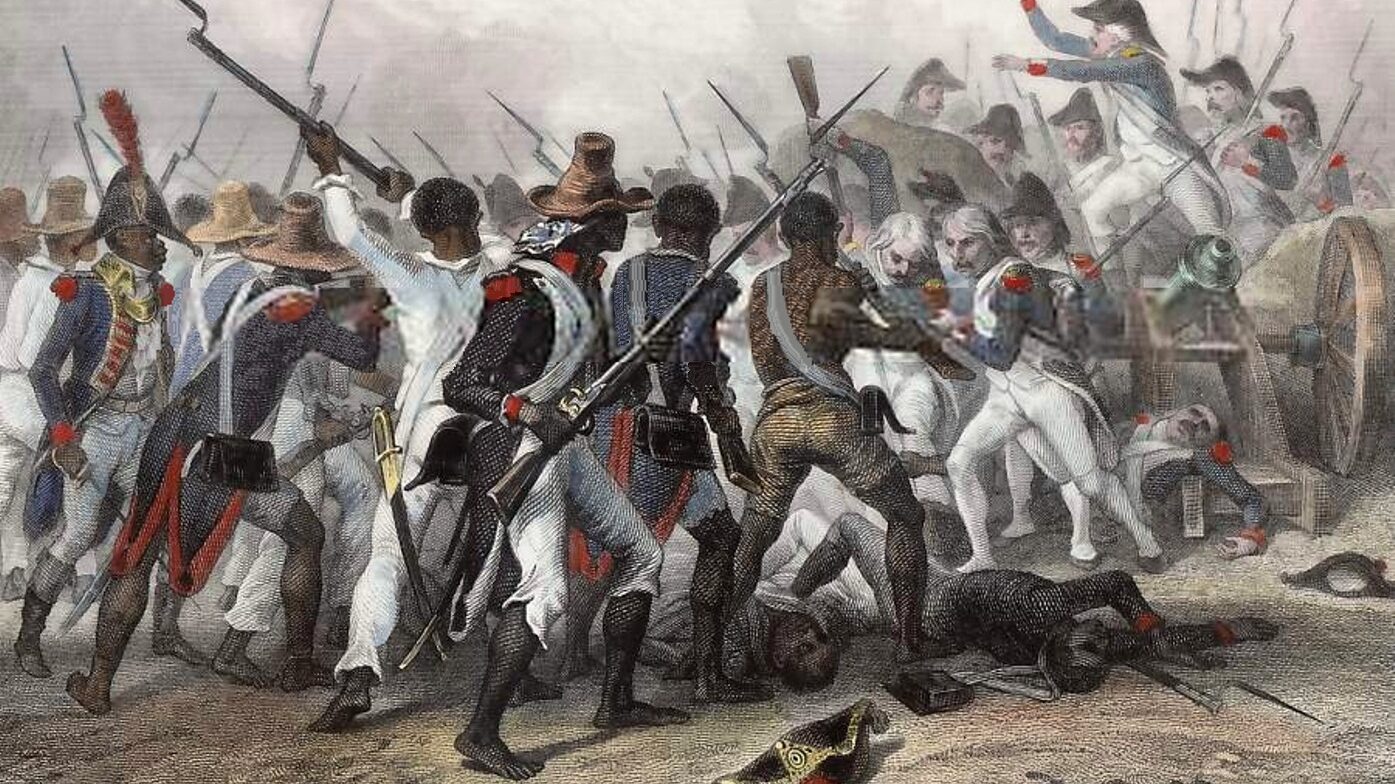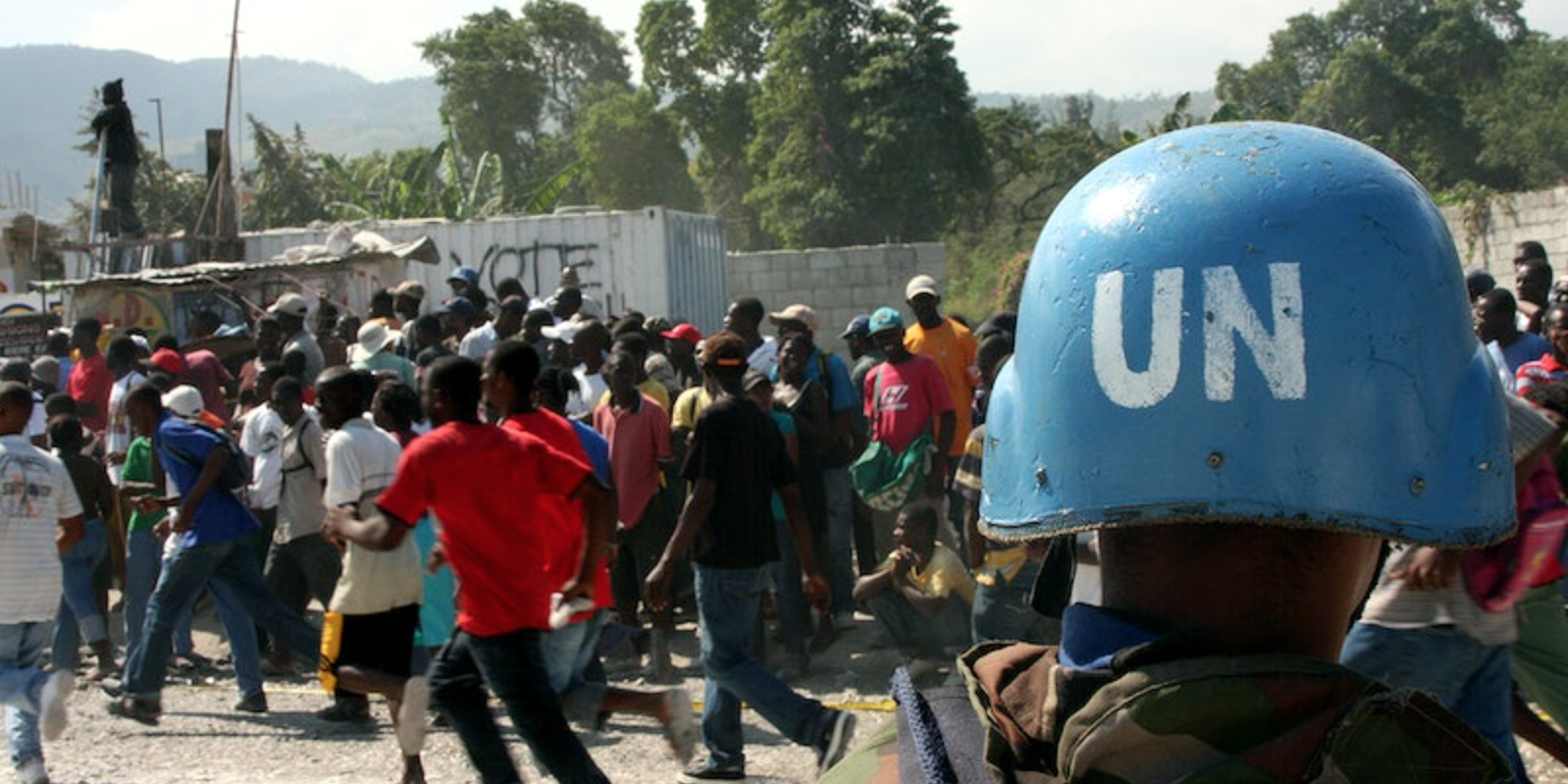Since the beginning of March 2024, Haiti’s capital, Port-au-Prince, has been engulfed in an escalating war between armed gangs and police, leaving civilians caught in the crossfire. Growing violence has crippled most of the country’s major infrastructure and institutions. Schools and hospitals are closed. Prisons have been raided and detainees released. No flights are leaving or entering the gang-occupied airport.
This acute period of crisis arose amid calls for ex-Prime Minister Ariel Henry to resign from office. Now, with war still raging, a council has been convened to select a new leader and attempt to re-establish order. A look back at Haiti’s history reveals, however, that the current situation is the result of over 200 years of repression and resistance.
The Republic of Haiti was founded in 1804 out of a slave revolt in the French colony of Saint-Domingue. The wealth of sugar and coffee produced by the slaves forced to work Saint-Domingue’s plantations financed no small part of the magnificent palaces and lavish parties of the French aristocracy. Saint-Domingue was particularly brutal, even among French colonies. Slaves rarely lived past the age of 40, which created a demand for a constant supply of new captives imported from Africa.
Before the 1791 revolution, Saint-Domingue’s population included 25,000 French colonizers, 22,000 ‘mulattos‘ (descendants of the children of white colonizer men and African slave women who were granted partial citizenship), and 700,000 African slaves.
Two years after the French Revolution upturned the old order of the metropole, slaves in Saint-Domingue organized among themselves in the woods outside their plantations to overthrow their masters. After 14 years of war, during which Haiti fended off a force sent by Napoleon, costing him more men than the battle of Waterloo, this country of slaves emerged victorious.

Following Napoleon’s downfall and the restoration of the French monarchy, King Charles X was under pressure from French aristocrats to recoup the “losses” they incurred due to the liberation of Haitian slaves. Twenty years after the Haitian revolution, the French returned to Port-au-Prince with a fleet of gunboats and an ultimatum: pay reparations or face re-enslavement.
Isolated by nearby slave-owning republics (including the United States), Haiti was forced into a debt of 150 million francs (a sum up to 33 times larger than the nascent republic’s annual income), to be repaid in five annual payments.
Every ounce of gold and every available commodity was sold to make the first payment. The second defaulted.
France returned again with gunboats and marines to force Haiti into a second loan. For the next century, the poorest Haitians toiled to repay the debt, largely through the taxation of coffee and sugar produced by the rural peasants who were freed during the revolution.
Income from the financing of Haiti’s debts funded the industrialization of France through the banks, which had effective control over Haiti’s treasury. Finances within Haiti were managed by an elite class mainly descended from the mulattos who moved into the cities and established early governments after the revolution. They now formed a class of middlemen, enriching themselves through the system that kept Haiti in financial chains.
By the early 20th century, after the United States adopted the Monroe Doctrine opposing European colonial influence in the New World, American business investment began undercutting French influence on the island.
After a pro-American president was overthrown in 1915, the United States (encouraged by Wall Street business interests, namely the precursor to Citigroup) took on the French tradition of sailing gunboats into Port-au-Prince and pilfering its coffers with Marines, stealing US$500,000 worth of gold (a value of $15 million today).

This marked the beginning of a 19-year occupation of Haiti, during which time the U.S. used forced labour to build military infrastructure and secure its interests. The Americans rewrote Haiti’s 1805 constitution to allow for foreign land ownership, securing U.S. property rights in the territory. They also established the Haitian Gendarmerie, a military police force that went on to become the modern Haitian military, keeping American peace in Haiti for decades to come.
By 1957, tensions between rural Black working Haitians and urban mulatto middle and elite classes were beginning once again to boil over. François “Papa Doc” Duvalier, a Black doctor from Port-au-Prince, rose to political power by riding this wave, promising to develop and reform the Haitian economy to better serve its impoverished Black population.
After an attempted military coup, Duvalier quickly consolidated his control over Haiti’s elite class, forming a paramilitary police force called the Tonton Macoute who enforced his rule through terror.
Duvalier’s became increasingly paranoid, particularly as socialist revolution got underway in nearby Cuba. He began rebuilding strategic ties with the U.S. and mobilized his Tonton Macoute to slay Haitians suspected of communist organizing or any other acts that could destabilize his rule.
Papa Doc died of heart disease in 1971 and was succeeded by his son Jean-Claude “Bébé Doc” Duvalier, who further developed Haitian-U.S. relations, privatizing state institutions and maintaining the regime of terror. Bébé Doc was deposed by a 1985 rebellion, from which he fled to France in a U.S. jet.
In 1991, Haiti held its first election since 1957. The winner was Jean-Bertrand Aristide, a Catholic priest who had opposed the Duvalier regime. Aristide led the popular Famille Lavalas movement on a platform of justice for victims of Duvalier and transparency of government.
Aristide’s term began in February of 1991 and lasted until September of 1991 when a military coup forced him to flee. He returned to the country two years later, aided by a UN mission of 1,200 police and military personnel, allowing him to serve only the last two years of his five-year presidential term.

Aristide was re-elected in 2001, now demanding reparations from France for the Haitian wealth held ransom after the nation’s founding. He was unseated again in 2004, this time by a force backed by the United States, France, and Canada, who stayed in the country by UN mandate.
For the next 17 years, Haiti continued under effective occupation. Its economy was managed by a corrupt elite class that embezzled money from development assistance funds. The poorest Haitians migrated to cities to work in foreign-owned garment factories after centuries of mismanagement destroyed the land’s capacity to sustain any significant agricultural or livestock industries.
Foreign forces, including UN personnel sent by the United States, France, and Canada (especially after the 2010 earthquake) caused massive cholera outbreaks by dumping raw sewage into local water tables and fathered a generation of unclaimed children. After decades of this “foreign aid,” Haiti has little functional non-military infrastructure and dwindling access to healthcare, education, clean drinking water, or food.
Special thanks to historian Alain Saint Victor for his consultation on this piece.
